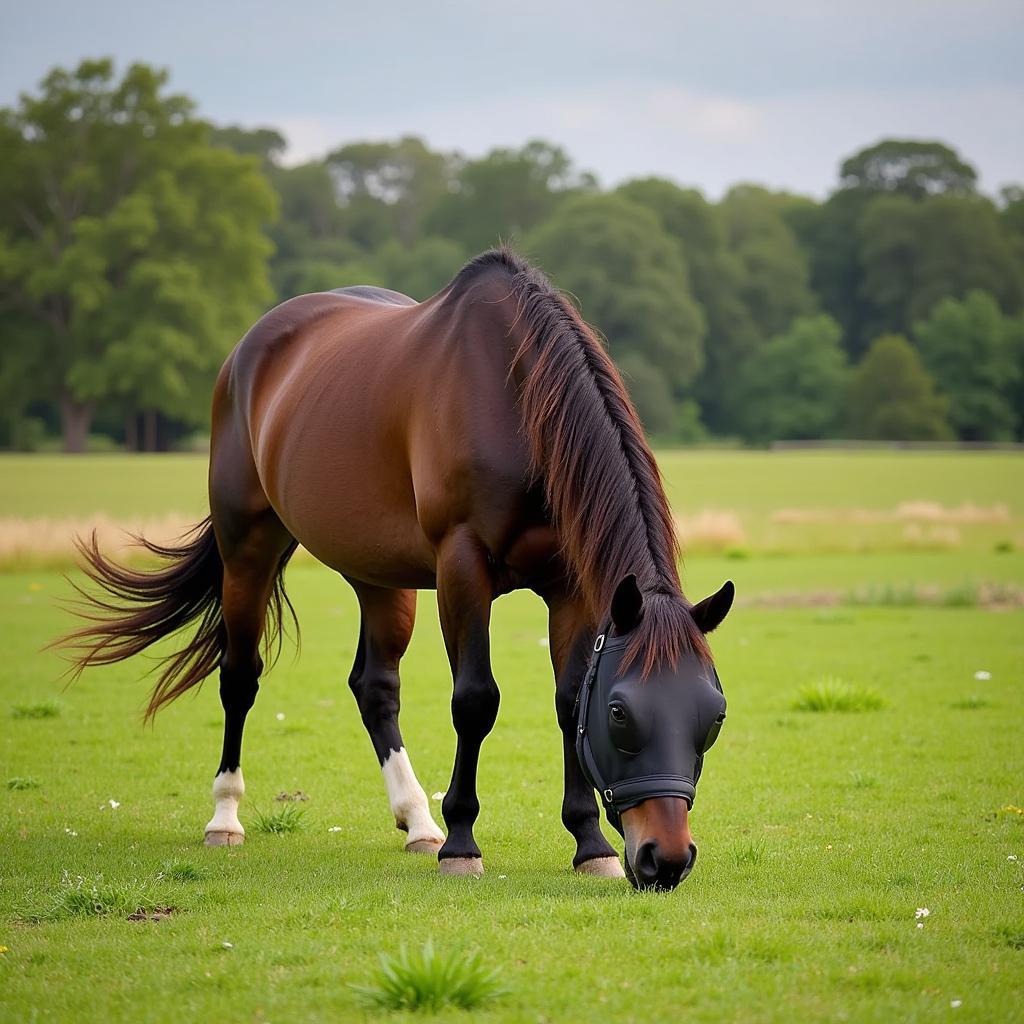Pine Sol, a common household cleaner, is sometimes discussed as a potential fly repellent for horses. This article delves into the safety and effectiveness of using Pine Sol Fly Spray For Horses, exploring the risks and benefits, and providing effective alternatives. We’ll examine why this practice is discouraged and offer safer, more effective solutions to keep your equine companion fly-free.
The Dangers of Pine Sol on Horses
While some horse owners may swear by Pine Sol as a fly spray, the potential risks significantly outweigh any perceived benefits. Pine Sol contains a cocktail of chemicals, including pine oil, isopropyl alcohol, and various cleaning agents, that can be harmful to horses. Direct application to the skin can cause irritation, allergic reactions, and even chemical burns. Ingestion can lead to serious digestive issues and toxicity.
Furthermore, the strong odor of Pine Sol can irritate a horse’s sensitive respiratory system. Remember, a horse’s skin is much more sensitive than human skin, and what might seem like a mild irritant to us can be incredibly uncomfortable for them. Even diluted solutions can pose a risk, and the potential for long-term health problems is simply not worth the gamble.
Safe and Effective Fly Control for Horses
Fortunately, there are numerous safe and effective fly control methods specifically designed for horses. These include:
- Commercial Fly Sprays: Choose a reputable brand formulated for equine use. Look for products containing pyrethrins, permethrin, or DEET, but always follow the manufacturer’s instructions carefully.
- horse sprayer
- Fly Masks and Sheets: These physical barriers protect your horse’s face and body from flies.
- Fly Boots: These specialized boots prevent flies from biting a horse’s legs and ankles.
- fly boots horses
- Environmental Control: Manure management, eliminating standing water, and using fly traps can significantly reduce fly populations around your stable.
- fly spray concentrate horse
Why Some People Use Pine Sol (and Why They Shouldn’t)
The myth of Pine Sol as a fly repellent likely stems from its strong pine scent, which some believe repels insects. However, there’s no scientific evidence to support this claim, and the risks associated with its use far outweigh any potential, unproven benefits.
Is Pine Sol Ever Safe for Horses?
Absolutely not for direct application. While highly diluted Pine Sol might be used for cleaning stable surfaces, ensure it’s thoroughly rinsed and the area is well-ventilated before allowing your horse back in. Even then, safer cleaning solutions specifically designed for barns are readily available.
Choosing the Right Fly Control for Your Horse
The best fly control strategy depends on your horse’s individual needs, your environment, and the severity of the fly problem. Consider factors like your horse’s sensitivity to certain chemicals, the prevalence of flies in your area, and your budget. Consulting with a veterinarian can help you determine the most effective and safe fly control plan.
Dr. Emily Carter, DVM, Equine Specialist, advises, “Never use household cleaners on your horse. Their skin and respiratory systems are delicate, and these products can cause serious harm. Stick to proven, equine-specific fly control methods for the safety and well-being of your animal.” ulcer in horses eye
Conclusion
Using pine sol fly spray for horses is a risky practice with no proven benefits. Prioritize your horse’s health by choosing safe and effective fly control methods designed specifically for equines. Don’t gamble with your horse’s well-being – opt for solutions that are both effective and safe.
 Horse wearing a fly mask
Horse wearing a fly mask
FAQ
- What should I do if my horse has an adverse reaction to a fly spray? Immediately rinse the affected area with water and contact your veterinarian.
- Can I make my own fly spray for my horse? While possible, it’s safer to use commercially available products formulated for horses.
- How often should I apply fly spray to my horse? Follow the manufacturer’s instructions on the specific product you choose.
- Are there any natural fly repellents for horses? Certain essential oils, like citronella and lavender, are thought to have repellent properties, but their effectiveness is limited.
- What’s the best way to protect my horse’s eyes from flies? A fly mask is the most effective way to shield your horse’s eyes from flies.
- Can stable flies cause health problems for horses? Yes, stable flies can transmit diseases and cause painful bites that can lead to secondary infections.
- How can I reduce the fly population around my stable? Proper manure management, eliminating standing water, and using fly traps are crucial for minimizing fly breeding grounds.
For further information on horse care, check out our other articles on horse sprayer.
When you need assistance, please contact us via Phone: 0772127271, Email: [email protected] Or visit us at QGM2+WX2, Vị Trung, Vị Thuỷ, Hậu Giang, Việt Nam. We have a 24/7 customer support team.